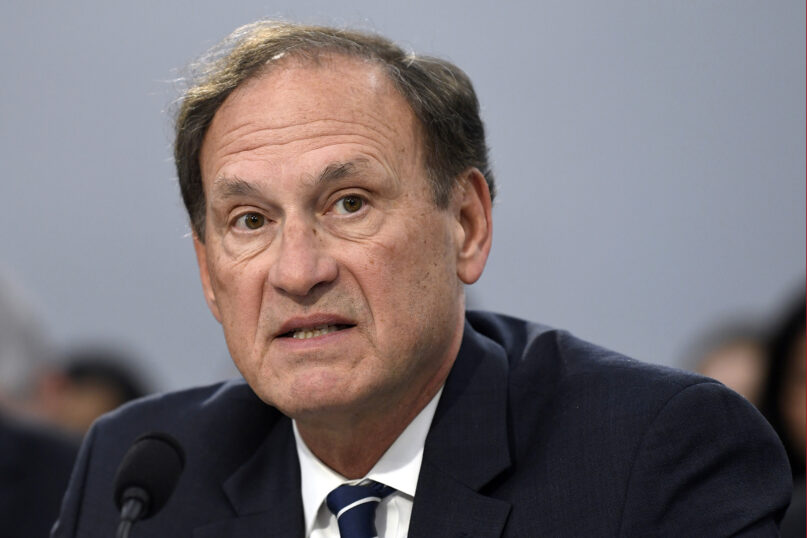(RNS) — “Religious liberty,” Supreme Court Justice Samuel Alito asserted in his keynote address to the Federalist Society last week, “is in danger of becoming a second-class right.” Before getting down to cases, Alito called this a “surprising turn of events,” given what things were like in the 1990s.
When a Supreme Court decision called Employment Division v. Smith cut back sharply on the protection provided by the Free Exercise Clause of the First Amendment, Congress was quick to respond. It passed the Religious Freedom Restoration Act (RFRA) to ensure broad protection for religious liberty.
True enough. RFRA passed Congress almost unanimously and was enthusiastically signed into law by President Clinton, who chastised the press for not paying enough attention to it.
But hold on a minute. If there was such unanimity of support for religious liberty back in the ’90s, why did SCOTUS cut back on free exercise protections in the first place? Was it some liberal legal plot to undermine America’s First Freedom?
By no means. The Smith decision was the brainchild of the late Justice Antonin Scalia, whose place in the pantheon of contemporary conservative jurisprudence is unrivaled.
The Smith case involved two drug counselors who were fired because, as members of the Native American Church, they used peyote as a sacrament. Under the court’s decision, because the ban was not restricted to drug counselors of any particular faith, but to all drug counselors, they could not claim a violation of their free exercise rights.
In legal terms, Scalia’s argument got rid of the court’s “strict scrutiny” standard of review for anyone seeking to be exempt from a law or regulation under the Free Exercise Clause. That’s to say, the government no longer had to demonstrate that it had a compelling interest in rejecting such a claim and that it was doing so by the least restrictive means.
So long as a law or regulation was “neutral” and “generally applicable” — that is, so long as it did not single out a particular religious group or practice for disfavor — it was proof against free exercise claims.
It was the Rehnquist court’s most liberal justices at the time, William Brennan and Thurgood Marshall, who joined Harry Blackmun’s dissenting opinion in the case, supporting the drug counselors’ free exercise claim.
Here is not the place to detail the subsequent history: how RFRA sought to mandate strict scrutiny as the constitutional standard; how the Supreme Court rejected that, but accepted the law as applicable federal statute; how the court made exceptions for zoning cases and prisoners; how states passed their own RFRAs; and how RFRAs came to occupy center stage in the country’s culture wars.
For now, it’s simply worth asking what happened to transform Scalia & Co.’s blithe undermining of religious liberty into Alito & Co.’s bitter lament that it’s becoming a second-class right.
The answer is that prior to Smith — and indeed, back to the Jehovah’s Witnesses’ proselytizing and flag salute cases of the 1940s — free exercise claims tended to come from small, often disfavored religious minorities with eccentric religious practices. Scalia had little patience with them, denouncing “a system in which each conscience is a law unto itself.” If plaintiffs wanted an exemption from an existing law, let them get it from their legislatures, he wrote.
Since then, however, free exercise cases have increasingly been advanced by large and powerful minorities — evangelicals, Catholics — who want the courts to allow them to avoid anything that smacks of accepting new social norms (and constitutional rights) like same-sex marriage.
The Supreme Court’s big religion case this year is Fulton v. Philadelphia, in which Catholic Social Services (CSS) sued the city for no longer referring children to it for foster care placement because of its policy of not placing them with same-sex couples. In contrast to the free exercise cases of the past decade, Employment Division v. Smith is on the table for debate.
At oral argument earlier this month, Alito asked CSS’ lawyer about the “stability” of the Smith precedent. In his Federalist Society speech, he went out of his way to indicate that he supports the traditional free exercise claims of small minorities, including “Muslim police officers whose religion required them to have beards, a Native American who wanted to keep a bear for religious services.”
I’d say he’s looking for the chance to reverse Scalia and bring Smith’s two-decade-old reign to an end.






